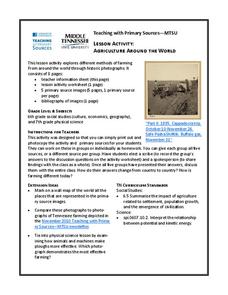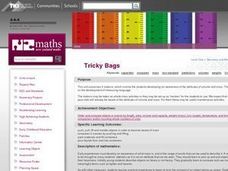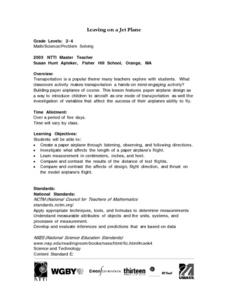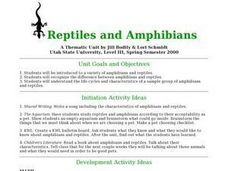Curated OER
Finding the Percent of a Number
In this mathematics worksheet, 6th graders find the percents of various numbers. They set up the problem, estimate, and write their response. Students also compare their answers to their estimates for each problem.
Curated OER
Random Sampling
In this random sampling worksheet, students compare data collected by a random sample to data collected by an actual count using pieces of paper with numbers written on them. They compare their data for the actual count to the random...
Curated OER
Agriculture Around the World
Students explore various kinds of farming methods around the world. In this history lesson, students view pictures of farming methods, then compare and contrast them in a class discussion with the methods of farming that are used...
Pennsylvania Department of Education
Multiplication Represented as Arrays
Third graders collect data about themselves and use in a line plot. In this analyzing data lesson, 3rd graders collect various sets of information,create a line plot and compare the data. Students complete a worksheet on their...
Curated OER
Working It Out
Students participate in a simulation in which they are arbitrarily assigned different work roles and compare their experiences to those discussed in a New York Times article about the racial divisions in a pork production plant.
Curated OER
Volume and Mass: Identify the Attribute
Students rotate through five studying stations related to the attributes of volume and mass. They manipulate objects to explore mass, compare two masses by pushing and lifting, pack materials and fill containers, and pour liquids from...
Curated OER
Geoboard Squares
Students create squares of different sizes on a geoboard. They find and describe a pattern. Students use the pattern to determine the number of squares possible on a 10-by-10 geoboard. They create squares with a horizontal base (and...
Curated OER
Temperature
Students understand that temperatures in Alaska can be negative numbers. In this temperature lesson, students recognize the temperatures above and below zero. Students compare temperatures using the greater than and less than signs....
Curated OER
Apple Estimation: Percentages & Subjective Reasoning
Students practice using their estimation skills by utilizing apples. In this percentage lesson, students utilize a scale and an apple to discover the percentage of each bite they take. Students share their data with the rest...
Curated OER
Sizing Up the Supersize Croc
Students examine and compare traits of humans and crocodiles. In this crocodile lesson students use a ratio to estimate the height of a person and compare that to a crocodile.
Pennsylvania Department of Education
Use Order of Operations to Evaluate Expressions—No Grouping Symbols
Students identify and explain different types of data collection and graphs. In this graphs and data collection lesson, students record their observations of a variety of data collection tools and graphs displayed in the room. Students...
Curated OER
Understanding a Legislator
Using a videoptaped segment of a Connecticut legilative session, students role-play designated legislators, researching positions, and making presentations. They compare their class votes with the actual outcome.
Curated OER
Pocket Change
Students practice identifying coins and their values. For this money identification lesson, students play a game, where they toll a coin, determine the value, and compare totals to win.
Curated OER
Time: Attribute
Learners participate in five teacher-led, whole class activities that explore sequences of time and the concept of faster and slower. They sequence school day events, create a book of their daily schedule, put the days of the week in...
Curated OER
Quarters and Dollars
Second graders determine value of quarters and dollars, solve real-life problems involving money, and compare values of sets of coins and bills.
Curated OER
Leaving on A Jet Plane
Students create an airplane by listening to directions. They also to measure the pieces for the airplane and compare and contrast their test flights.
Curated OER
Music Composition
Students compose a simple melody using the notes of the D Major Scale. Criteria/Rubric for evaluation is provided with variations depending on skill level of students. A minimum of one forty-five minute class period is needed for this...
National First Ladies' Library
Impeachment!
Young scholars investigate the impeachment proceedings against Andrew Johnson, Richard Nixon, and William Clinton. In small groups they conduct Internet research on one of the three Presidents, and present a "brief" on the case,...
Curated OER
Rights and Responsibilities: Making the Connection
Middle schoolers examine the Bill of Rights. In this philanthropy lesson, students identify the responsibilities that accompany the 5 basic guaranteed rights in the Bill of Rights. Middle schoolers interview a community member regarding...
Curated OER
Haiku Wrap Up
Students create a haiku about the land formations they've studied. In this haiku lesson, students identify the metaphor and meaning of a given haiku, brainstorm comparisons for a landform photo as a class and choose one to use in a...
Curated OER
Living and Nonliving Things
Students photograph five objects from a bag and five objects from the outdoors. Students categorize things by living and non-living and by properties such as color, size, structure and needs. Students draw conclusions about the basic...
Curated OER
Natural Inspiration
Students relate math to the real world. In this algebra instructional activity, students compare plants to math and relate their artistic ability to concepts in math. They draw pictures of flowers, leaves and trees.
Curated OER
Paint's Family Tree
Learners sort and classify the genetic traits of horses. In this heredity and genetics lesson, students read dialogue in a skit in which specific physical traits of several horses are described and a horse family tree is created....
Curated OER
The Anaconda
Young scholars examine basic facts about the anaconda. They discuss the length of an anaconda, estimate the length of 33 feet, compare their estimate to the actual length, and decorate the paper snake with colored scales.

























